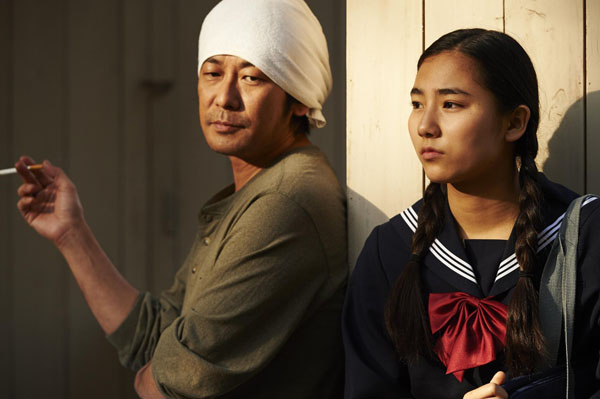Naomi Kawase’s An is “a cloyingly sentimental yarn of an elderly pastry chef transforming lives around her through the magic she does with the titular pancake filling,” writes Michał Oleszczyk. “Kawase is a long-time Cannes darling and I may be alone in my emotional immunity to her films, but it needs to be said that this particular one feels extremely calculated in its effort to become an arthouse version of the popular inspiration-through-cookery genre that gave us Babette’s Feast and Chef at its best, and Chocolat and Eat Pray Love at its worst.”
But for Barbara Scharres, also dispatching to RogerEbert.com and also not quite a Kawase fan, this is “her best and most mature film to date. An, aka Sweet Bean Paste, is named for the filling of a dorayaki, a sweet snack, essentially a pancake sandwich, that is central to this story based on a book of the same title by Dorian Sukegawa. The small cast is uniformly excellent, but is most of all anchored by a lovely, moving performance by veteran actress Kirin Kiki, whose long career has included films with such adventurous directors as Seijun Suzuki and Masahiro Shinoda.”
Kiki plays Tokue, “who one day shows up at a little creperie stand run by Sentaro (Nagase Masatoshi), a dour, silent guy,” explains the Guardian‘s Peter Bradshaw. And the “regular customer is Wakana (Uchida Kyara), a teenage girl who is concerned about this melancholy-looking guy serving her.” If only “this old lady was not preternaturally wise, and if her subsequent relationship with Sentaro did not soothe his cares and redeem his troubled soul.” Overall, for Bradshaw, An “has an impeccable technical finish, but it is insipid, contrived, solemn, and ever so slightly preposterous.”
The Playlist‘s Oliver Lyttelton agrees that “it proves to be as disposable as the snack it revolves around.” The Hollywood Reporter‘s Deborah Young finds that “An aims so low that it makes good on its modest ambitions. These are to underline the injustice of Japan’s former treatment of persons with contagious diseases, and to highlight the warmth of a selfless elderly woman who brightens the days of everyone she comes in contact with. It’s not the stuff of Shakespearean drama, and in fact is barely enough to squeeze a few tears out of audiences into sentimental fare.”
“An is crafted with Kawase’s characteristic preference for deliberate rhythms and organic naturalism,” writes Variety‘s Guy Lodge. Shigeki Akiyama’s “airy lensing fully exploits the ample pictorial possibilities of Kawase’s chosen imagery—there’s no room for jagged edges or synthetic shades. David Hadjadj’s lacy, piano-based score sometimes overeggs the pancake, so to speak, but after the oppressively introverted nature of Kawase’s last few films, catering too much to the audience seems a forgivable error.”
More from John Bleasdale (CineVue, 3/5) and Dan Fainaru (Screen). And Cannes has posted its interview with Kawase.
Updates, 5/18: Kawase’s “previous feature, Still the Water, played Cannes just one year ago, premiering to an array of abrasive pans,” notes Adam Cook at Indiewire. “Some called it the very worst film of last year’s festival, but it seems that Kawase’s standing with the programming team seems remarkably forgiving and perplexingly stalwart…. The disconcerting thing here isn’t that Cannes programmed a bad film—that’s certainly nothing new—but that the festival has showcased multiple failures by this one director: films with no stakes that resemble other, better films, many of which don’t make the cut.” And “it’s a programming choice like this that should provoke genuine skepticism about the process behind the curtain.”
But at the Film Stage, Zhuo-Ning Su argues that An is “a well-crafted mainstream effort with accessible emotions and that whiff of Kawase-que zen. In terms of artistic aspirations, it aims a little lower, but at any given point, it feels honest and earthily relatable, which is actually more than one can say about many of the high-minded competition films.”
Updates, 5/19: “Admittedly,” writes Alex Ramon at PopMatters, “the final scenes do slide into mush, not matching the genuine poignancy of the rest of the picture. But An remains a disarmingly tender and restorative movie, and as gentle and hospitable an entrée into Cannes as one could wish for.”
“It is a nice enough piece, but it will not be rattling the plates in anybody’s pantry,” writes Donald Clarke in the Irish Times.
Cannes 2015 Index. For news and tips throughout the day every day, follow @KeyframeDaily. Get Keyframe Daily in your inbox by signing in at fandor.com/daily.




